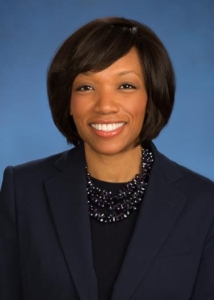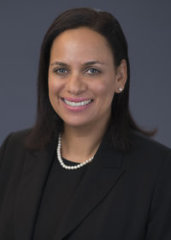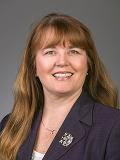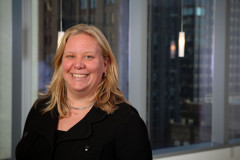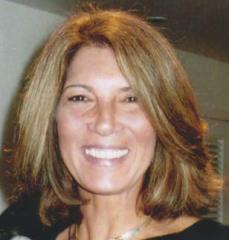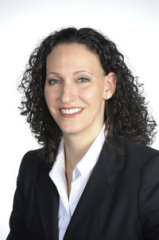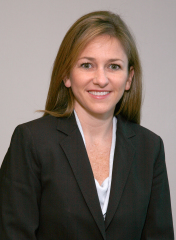 Sometimes dad knows best. That’s what Natasha Moffitt, Partner at King & Spalding, learned when following her father’s suggestions for her career path.
Sometimes dad knows best. That’s what Natasha Moffitt, Partner at King & Spalding, learned when following her father’s suggestions for her career path.
Raised in Germany by a German mother and American father, Moffitt decided in high school that she wanted to be a lawyer, but her father urged her to leverage her skills in math and science. He counseled her to first pursue a computer engineering degree (an emerging field of study at the time), and then a career in patent law; and that’s when her career path was born.
Moffitt graduated with a computer engineering degree and a minor in German, and then worked as an engineer for several years before pursuing her law degree, focused all the while on becoming a patent attorney.
“Many engineers don’t consider patent law as a career path until later in their careers; I decided to pursue patent law from the get go.” She became a summer associate at King & Spalding in 2000, joined the firm full time in 2001 and was elected to the partnership in 2008.
Meaningful Wins Are Key to Satisfaction
While she is naturally pleased about all the wins she achieves for clients, one win in particular stands out. She defended a client in patent litigation brought by a competitor, with enormous stakes that were “do or die” for both sides.
For more than a month the case was tried, and she was delighted to score an outright win, which was later affirmed on appeal.
“Unfortunately, patent litigation has become a routine ‘cost of doing business’ for many companies, but in this case, the suit was directed toward an important part of the client’s business, and it was critical that we win. I always play to win, but this win was especially sweet.”
Moffitt currently is excited about the business development work she’s doing in Germany and other German-speaking countries. “It’s a good fit, given my language fluency and heritage. German tech companies are frequently sued in the United States for patent infringement. I am fortunate to be collaborating with a group of partners who also have German ties and an interest in expanding our footprint to the German market.” She describes it as a “coming home of sorts,” allowing her to marry her personal history with her profession in a way she never dreamed possible when she started her career.
She also views the recent changes in patent law as an area of ongoing fascination – with the increased interest by the Supreme Court, the media, legislators and company executives. “There is ongoing spirited debate involving patents and what should be patentable,” she says. “Different industries have differing views – there’s a lot of discussion but no clear answers. As the entire industry changes in an unprecedented way, we will be tracking the developments and counseling our clients on what these changes mean for their patent portfolios and litigation strategies.”
More to a Law Career than the Law
As Moffitt has ascended the ladder, she’s learned that law partners must wear multiple hats – as mentors, teachers, managers, recruiters, marketing professionals and accountants.
“When I started my legal career, I expected that lawyers would spend most of their day practicing law; I didn’t appreciate how many roles we would have to play,” she says. “Law school gives you the skills you need to become a great lawyer. It does not train you how to do the rest. Over time, I have learned the business side of law and how to build a practice, but had I realized then what I know now, I would have focused the early part of my career on not only doing excellent work, but also on learning the business of building a practice.”
Changing Perceptions
One challenge she believes women may face in the industry is one of perception. “For high stakes patent litigation, more senior, male litigators may be perceived to be a safer hiring choice than female litigators,” Moffitt says. “Women litigators simply need to demonstrate that this perception is unwarranted. With time we can change these biases, but it takes women stepping up and showing they are as good as, if not better than, their male counterparts.”
She sees the industry becoming more accessible as more women enter into math, science and engineering-related disciplines in college, which may translate into more women practicing in the area of intellectual property, but there is still room for improvement.
She believes it’s important for those already working in the technology industry to educate the women who are following them about what the opportunities are – that they can become engineers, scientists and researchers, but there’s also an alternative path in the law.
And for women who are getting started, she advises them to invest in their career by taking advantage of every opportunity and experience – and if you’re not getting the opportunities you seek, then go find them.
“People will be impressed by the initiative. It’s vital to create opportunities for yourself if they’re not coming to you for one reason or another.”
And she says that while women should be the best they can be at any given moment, they should cut themselves some slack.
“Women can be unnecessarily hard on themselves – we want to be perfect in all areas – as a mom, spouse, and employee – and then we give ourselves a hard time when we feel we’re not meeting our own expectations.”
For women at her level, Moffitt recommends building a practice by focusing on one particular area for business development. “Sometimes lawyers want to appear as a jack of all trades, but that can dilute the expertise you do have,” she says. “Clients are looking for subject matter experts, so you don’t want to spread your expertise too thin.” She sees this as particularly important for women who are balancing family, work and other time commitments, that in order to make your limited time count, you have to identify your strengths and focus your efforts there.
Committed to Diversity
Moffitt says her firm is very committed to diversity with committees, initiatives and events, and she has been active in both informal and formal diversity programs. She feels fortunate that she has had lots of mentors at the firm over the course of her career, and in return she has mentored others in a variety of capacities – always finding the informal relationships to be invaluable.
Currently, she is co-leader of the Atlanta office’s Women’s Initiative, which creates networking and mentoring opportunities for the firm’s Atlanta women lawyers, but also provides tools to help women attorneys expand their profile internally and externally. Recently she hosted a guest speaker to talk to the women attorneys about how to maximize the impact and visibility of their LinkedIn profile, for example.
Sharing Love of Horses and Heritage
A busy mom with three kids ages three, six and nine, Moffitt sees weekend time as family time. One hobby she’s been able to share with them is her love of riding dressage competitively– she recently competed in the U.S. national and regional championships. Her oldest daughter has started riding, and all of them enjoy spending time at the barn.
In addition she is sharing her German heritage, raising them to be bilingual by attending an international school where they learn in German and English.
“It’s a challenge to make time for everything, but it’s worth it. I’ve gotten really good at time management!”
By Cathie Ericson

